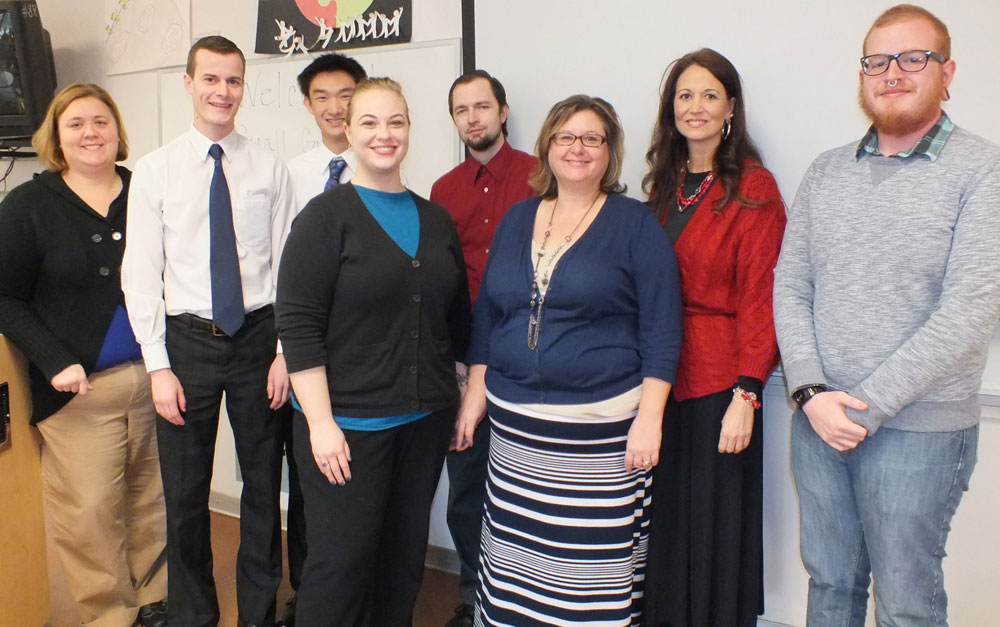Clark's Honors Program gives high-achieving students real-life experience with teamwork

Professor Deena Godwin, far left, with Honors Program students Patrick Hardy, Christopher Yoong, Alida van Breda, Jason Langley, Lynne Rochelle, Jennifer Campbell, and Ben Putnam.
Clark is well known for providing its students with hands-on learning opportunities in career-oriented fields like nursing, dental hygiene, and automotive technology. Even so, you might imagine that the highly academic and cerebral Transfer AA Honors Program would be too elevated an atmosphere for “learning by doing.”
Guess again: As the students in Prof. Deena Godwin’s Honors Small Group Communication class explained during a presentation on December 5, their experience with conquering a real-life challenge not only taught them how to apply the theories they’d learned in the class to an actual problem, but also helped prepare them for the sort of situations they’re likely to encounter in their work lives, no matter what field they wind up in.
The students were given an assignment at the beginning of the quarter: Come up with ways to introduce more Clark students to the Honors Program, a newly developed course of study designed to provide high-achieving students with challenging coursework to prepare them for pursuing higher degrees at four-year institutions.
None of the students had difficulty with the actual goal. As Honors Program students themselves, they knew first-hand the benefits of participating in the program: the chance to take academically challenging classes with other high-achieving students, the Honors credential on their transcripts, one-on-one mentoring with a faculty member, the freedom to really delve into a topic of interest through a capstone project, and scholarship opportunities through the Clark College Foundation’s Honors Program Scholarship.
But while the students were happy with the goal of the assignment, they were less sanguine about the format, which involved working in groups of three to five. (After all, the course is called Small Group Communication.) Many students originally balked at the idea of group projects, fearing that their classmates would not perform to the same high standards they set for themselves. “I came into this really scared because I knew it was a big part of my grade, and my grade is everything to me,” said Jason Langley.
What the students discovered was that their challenges of working in a group were not the ones they’d feared: For the most part, students did their work. Rather, the problems were ones encountered in many workplaces: conflicts in vision, differences in communication styles, negotiating between bright individuals who were accustomed to dominating their work groups, coordinating busy schedules, clarifying tasks and goals. This is when the tools they were learning in class came in handy. As the students continued their presentations, terms like “setting expectations” and “going back to our norms” began sneaking into their language.
In the end, the groups came up with varied ways of achieving the assignment’s goal, ranging from presentations to College 101 classes to a brief video outlining the Honors Program’s advantages. While the students encountered unexpected challenges–one group wound up having to dismiss a member, after weeks of mediation–they all agreed that the class had taught them valuable skills.
“Although we had a tough time working together as a group, I personally believe we’ll be better students and future employees because of this experience,” said Patrick Hardy, who was in the group with the dismissed team member.
Clark College Foundation CEO and President Lisa Gibert, who attended the presentation, agreed. “I would say you had the more valuable experience in many ways, because you are experiencing what you’re going to experience in the real world,” she said.
Student Ben Putnam said he planned to use the skills he’d learned through this assignment in future group work. “The next time I’m assigned to work in a team, I’ll be the weird guy who says, ‘Yeah, let’s write these rules down before we start,'” he said with a grin.
For more information about the Transfer AA Honors Program, visit www.clark.edu/honors.
Photo: Clark College/Hannah Erickson












